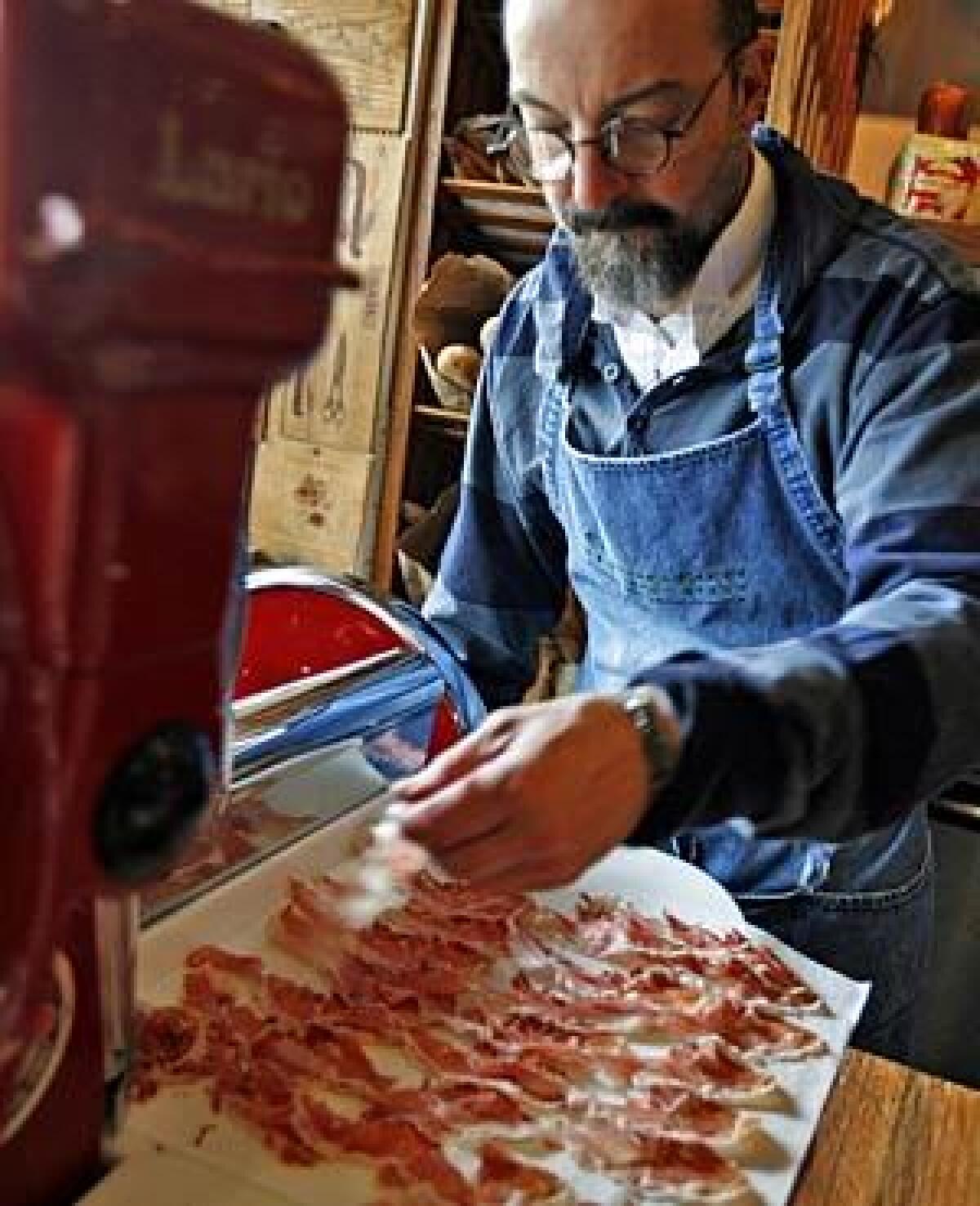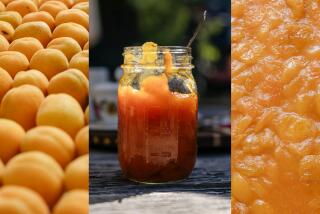Southern California has its jamón ibérico

- Share via
INTRICATELY marbled dark mahogany folds of ham, each with a generous edge of satiny cured fat, peel off the antique slicer at the Cheese Store of Beverly Hills. This is jamón ibérico, the legendary dry-cured Spanish ham that until last December was unavailable here because, although Spanish producers have been curing jamón ibérico for centuries, Spain had no production facilities approved by the U.S. Department of Agriculture.
American devotees, who had waited years for the jamón, worried that it would never arrive. When pigs fly, maybe. Well, the pigs finally flew.
Made from the pata negra, or black-footed pig, a Spanish breed that traces its origins to the region’s wild boars, jamón ibérico is richer, more complex and slightly gamier than prosciutto or jamón serrano (Spanish dry-cured “mountain” ham made from white domesticated pigs).
But this much-anticipated jamón, which takes more than two years to cure and sells for an astonishing $90 a pound, is just an appetizer -- a delicious first small plate -- for what’s to come.
Pièce de résistance
THE real prize is the jamón ibérico de bellota, hams made from those black-footed ibérico pigs that are allowed to roam the dehesa (Spanish oak-forested pasture land) and feed on its acorns. Bellota hams, still aging in their officially sanctioned curing houses, won’t reach U.S. shores until July.
Bringing the bellota to the U.S. is the final stage of an effort that began in 1995, when the Spanish company Embutidos Fermín, in the medieval town of La Alberca, broke ground on a slaughterhouse built to USDA specifications. Twelve years later, the first shipment of jamón ibérico arrived in the U.S. And in recent weeks, retailers and restaurants have finally made the glorious stuff available.
American importers including Harbor City’s La Española Meats Inc. -- so far the only California distributor -- and La Tienda in Virginia (the first U.S. recipient) all get their jamón ibérico from Fermín, the only company approved to export to the U.S.
Jamón ibérico and jamón ibérico de bellota are made from the same black-footed breed of pig, and both are cured by the same methods, using time, salt and some nitrates. But the bellota pigs, finished on acorns, produce hams that are more marbleized. This allows the hams to age longer, yielding a rich, intense, complex flavor.
Jamón ibérico cures for around two years, jamón ibérico de bellota cures for about three years, and some reserves cure for more than four.
“It’s slow cuisine,” says author Peter Kaminsky, whose book “Pig Perfect” chronicles the history of jamón ibérico, as well as other pig lore. “The longer it ages, the more complex the taste. It’s the same effect you’ll find with a good wine.”
While you’re waiting for the bellota, you can sample some of the regular jamón ibérico by picking up several slices (although metaphorically appropriate, you won’t need to break the piggy bank for a satisfying meal) at one of the specialty shops that carry it.
Get a few ounces per person and serve it simply, as they do in Spain, with a bit of bread, maybe a wedge of Idiazábal cheese and a glass of Lambrusco.
Or you can head over to Bar Pintxo in Santa Monica, where the luxuriously gamy slices are served on a plate with grilled bread and olives, or with a simple salad.
And there’s yet another teaser: Fermín has been exporting the cured shoulder of the bellota, called the bellota paleta. The curing time for the paleta, about the same as for the regular jamón ibérico, meant that it was available for export at roughly the same time. The paleta has a denser, nuttier flavor than the regular stuff; it’s so rich (Kaminsky describes the bellota pig as the “four-footed olive tree”) that it almost melts in your mouth.
Sticker shock
AT $120 per pound, the bellota paleta is pricier than the regular jamón ibérico, but a steal when compared with what slices of the bellota ham will go for -- about $150 to $180 a pound. Consider it an upgrade to business class.
Fermín’s export manager Raul Martin says the price is due to several factors. Not only must the pigs first be allowed to roam freely in the ancient oak forests, but the curing process takes a long time too. It’s “very expensive raw material -- the pig, obviously,” Martin said. And “you cannot forget that producing for the U.S. market is much more expensive than doing it for any other country of the world.” The USDA imprimatur does not come cheaply.
Martin didn’t want to predict more exactly what the price of bellota ham will be when it finally arrives, nor did Alex Motamedi, general manager of La Española. “A lot of it hinges on the dollar-Euro exchange rate; you’re also competing with everyone inside and outside of Spain who wants this,” Motamedi says. “I’m glad it’s so good, because the price is so ridiculous.”
Is the ham worth it? For jamón devotees, many of whom have been waiting for a very long time -- Tim Harris of La Tienda says he has some orders that were placed five years ago -- the answer is a resounding yes. “We can’t slice them fast enough,” he says.
If you want the extra pricey, acorn-finished jamón bellota, get in line. Or take a cue from author Kaminsky.
When asked if he’d reserved his ham yet, Kaminsky sighed and said, “I depend on the kindness of strange Spaniards.”
Don’t we all.
amy.scattergood@latimes.com
Jamón ibérico is available at Bar Pintxo in Santa Monica (also bellota paleta), (310) 458-2012; Cafe Surfas in Culver City, (310) 558-1458, www.cafesurfas.com; the Cheese Store of Beverly Hills (also bellota paleta), (310) 278-2855, www.cheesestorebh.com; Froma on Melrose, (323) 653-3700; www.fromaonmelrose.com; La Española Meats Inc. (also bellota paleta), Harbor City, (310) 539-0455, www.laespanolameats.com; Sapphire Laguna Pantry in Laguna Beach, (949) 715-9889, www.sapphirellc.com; Say Cheese in Silver Lake, (323) 665-0545 ; Wally’s Wine & Spirits in Los Angeles, (310) 475-0606, www.wallywine.com; and other specialty food stores.
More to Read
Sign up for The Wild
We’ll help you find the best places to hike, bike and run, as well as the perfect silent spots for meditation and yoga.
You may occasionally receive promotional content from the Los Angeles Times.











